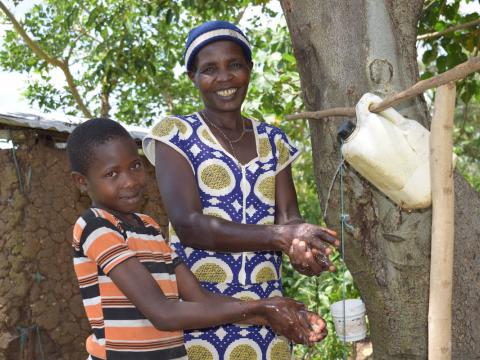Proper Toilet use Hygiene Enables Family to Prosper

By Hellen Owuor, Communications Specialist, World Vision in Kenya
At Ruth's homestead in Kiliboti area of Kenya's Kakamega County, there are several kitchen gardens blooming with an array of vegetables such as kale, spinach and tomatoes.
Ruth holds agriculture dearly, for it has enabled her to take good care of her three grandchildren ages 13, 7 and 3.
Despite her interest in farming, Ruth was unable to adequately invest in these efforts for many years.
Most of her household expenses were dedicated to the payment of medical bills, arising from sanitation-related complications, like diarrhoea, which regularly affected the children.
“Before, we were unaware of the importance of toilets, so we didn’t have them. Whenever we had the urge, we would rush to defecate in the sugarcane farms,” she says.
Faeces left in the open contaminate water sources and cause ailments in human beings. They also attract flies that spread various diseases – such as diarrhoea and cholera - especially in young children.
Luckily for Ruth, her problems came to an end after World Vision educated her and other community members about the importance of proper toilet use and good toilet hygiene.
“We learned that pit latrine holes should always be covered to prevent flies. I also know that it’s important to wash [my] hands with soap after visiting the toilet. This is information that I have also shared with the children.
"In addition, Ruth learned to maintain the cleanliness of her pit latrine toilet by smearing cow dung on its door to keep away worms and insects. She also sprinkles ash on the floor to eliminate the bad odour.
“Now that my grandchildren are healthy, I have more time and money to do other constructive activities. I can now engage in farming and use the profit I get to pay school fees and provide basic needs for them.”
Ruth is among the many beneficiaries of Water, Sanitation and Hygiene (WASH) projects in Kakamega County (Matete Area Programme) that are supported by World Vision donors in the United States.
Learn more about our other WASH projects here.